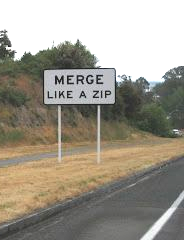
Peter Campbell Smith
Merge like a zip and Unidecode
Weekly challenge 186 — 10 October 2022
Week 186: 10 Oct 2022
Task — Zip list
You are given two lists @a and @b of the same size.
Create a subroutine sub zip(@a, @b) that merge the two list as shown in the example below.
Examples
Example Input: @a = qw/1 2 3/; @b = qw/a b c/; Output: zip(@a, @b) should return qw/1 a 2 b 3 c/; zip(@b, @a) should return qw/a 1 b 2 c 3/;
Analysis

Travelling in New Zealand we noticed that when two lanes of traffic merge into one, the road sign says 'Merge like a zip'. And that's what's needed here.
This could be achieved in a single line, but it would be a rather messy one, hard to understand or maintain. So let's not.
As stated, zip(@a, @b) will create a single array @_ which is the concatenation of @a and @b.
Lets' start by splitting that into the two equal length @a and @b. We can then create the desired output as:
push @result, $a[$_], $b[$_] for 0 .. @a - 1;
And that's it.
Try it
Script
#!/usr/bin/perl # Peter Campbell Smith - 2022-10-10 # PWC 186 task 1 use v5.28; use utf8; use warnings; binmode(STDOUT, ':utf8'); zip(qw/1 2 3/, qw/a b c/); zip(qw/c r e t a s e/, qw/o r c - n w r/); sub zip { my (@a, @b, $n, @result); # create output $n = @_ / 2; @a = @_[0 .. $n - 1]; @b = @_[$n .. @_ - 1]; push @result, $a[$_], $b[$_] for 0 .. @a - 1; # print it say qq[\nInput: (] . join(', ', @a) . qq[), (] . join(', ', @b) . qq[)]; say qq[Output: (] . join(', ', @result) . ')'; }
Output
Input: (1, 2, 3), (a, b, c) Output: (1, a, 2, b, 3, c) Input: (c, r, e, t, a, s, e), (o, r, c, -, n, w, r) Output: (c, o, r, r, e, c, t, -, a, n, s, w, e, r)
Any content of this website which has been created by Peter Campbell Smith is in the public domain